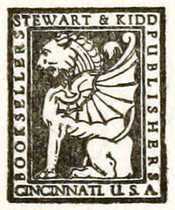GOAT ALLEY
Goat Alley
A TRAGEDY OF NEGRO LIFE
By
ERNEST HOWARD CULBERTSON

CINCINNATI
STEWART KIDD COMPANY
PUBLISHERS
COPYRIGHT, 1922, BY
STEWART KIDD COMPANY

All rights reserved
All acting rights, both amateur and professional, are fully protected
under copyright law and are reserved by the author. Application
to produce Goat Alley must be made to him, in care of
the publishers, Stewart-Kidd Company, Cincinnati.
Printed in the United States of America
The Caxton Press
INTRODUCTION
In a dingy little hall on a side street Mr. Ernest Howard Culbertsonbegan rehearsals of “Goat Alley,” his tragedy of Negrolife in a Washington slum. The actors were, with one exception,amateurs—colored working people who gave their time and servicesfor the sake of what they felt to be an artistic expression of thelife of their race. The author had no sociological intention; he hadno ambition to be a propagandist. He had not even a special interestin the racial problem. He thought that he had come upon an action thathas the quality of tragic inevitableness. He thought, furthermore, thattragedy does not reside in pomp and circumstance, but in the profoundrealities of human helpfulness and human suffering, and that poor LucyBelle struggling to maintain her spiritual integrity in Goat Alley wasa protagonist worthy of the sternest art and the largest sympathy.
He built up his action from within. He saw that the Negro cannot yethope, like the white man, to transcend common standards. He must firstreach them. Hence the Negro girl’s struggle for her own integrityis not yet the struggle of Nora or Magda—the struggle to be trueto herself; it is the struggle to remain true to the man of her realchoice. To transcend a necessary order one must first have achievedit. The achievement of social order in the moral sense is thereforethe[8]right and necessary aim of the Negro proletarian and the right andnecessary theme of a drama dealing with his life.
In the play, Lucy Belle fights valiantly her losing fight.Loneliness, poverty, ignorance, terror, drive her from disaster todisaster, from one unwilling infidelity to another. But she neverwavers in her soul. In her utter confusion and failure she killsthe child that stands between her and all her hopes and at onceexpiates that action with her own death. Neither the subject nor thecircumstances are new. But novelty is no mark of fine literature.The motives, the people, the place, the color of life—theseare new. Every triangle play